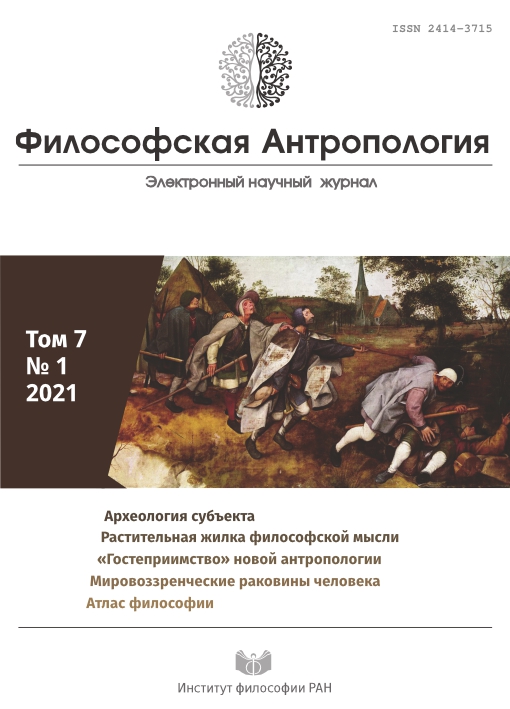The Philosopher’s plant: An Intellectual Herbarium (Herbarium Philosophicum (prologue), Plato’s Plane Tree (chapter 1))
DOI:
https://doi.org/10.21146/2414-3715-2021-7-1-24-46Keywords:
phytophilia, metaphysical tradition, intellectual herbarium, Plato, Socrates, J.-J. Rousseau, plane tree, heavenly plants, earthly plants, Myth of the CaveAbstract
Michael Marder, a well-known specialist in environmental philosophy and political theory, studied at universities in Canada and the United States, received a Ph. D. from the New School of Social Research in New York, and taught at the Universities of Georgetown, Saskatchewan, and Washington. He conducted research at the University of Lisbon and served as an associate professor of Philosophy at Duquesne University in Pittsburgh before becoming a research professor at the University of the Basque Country. M. Marder is a member of the editorial board of journal «Telos» (New York), as well as the editor of four book series: «Political Theory and Contemporary Philosophy», «Critical Plant Studies», «Future Perfect: Images of the Time to Come in Philosophy, Politics, and Cultural Studies» and «Palgrave Studies in Postmetaphysical Thought».
Michael Marder works in the phenomenological tradition of continental philosophy. He is the author of books «Grafts: Writings on Plants» (2016), «The Chernobyl Herbarium: Fragments of an Exploded Consciousness» (2016), «Heidegger: Phenomenology, Ecology, Politics» (2018) и «Dump Philosophy: A Phenomenology of Devastation» (2020). Most of his philosophical works are focused on constructing a concept in which plants are viewed as beings with their own form of subjectivity. He is best known for the monograph «Plant-Thinking: A Philosophy of Vegetal Life» (2013).
Marder's book «The Philosopher’s Plant (Intellectual Herbarium)» (2014), from which the prologue «Philosophical Herbarium» and the first chapter «Plato's Plane Tree» are taken for translation, is devoted to the relationship between philosophy and plants. The author believes that philosophy did not pay due attention to plants, and seeks to fill this gap. The book contains twelve stories, each of which relates a famous philosopher to a plant or flower (Plato’s Plane Tree, Avicenna’s Celery, Kant’s Tulip etc.), which, according to Marder, allows a deeper understanding of his philosophical ideas.

